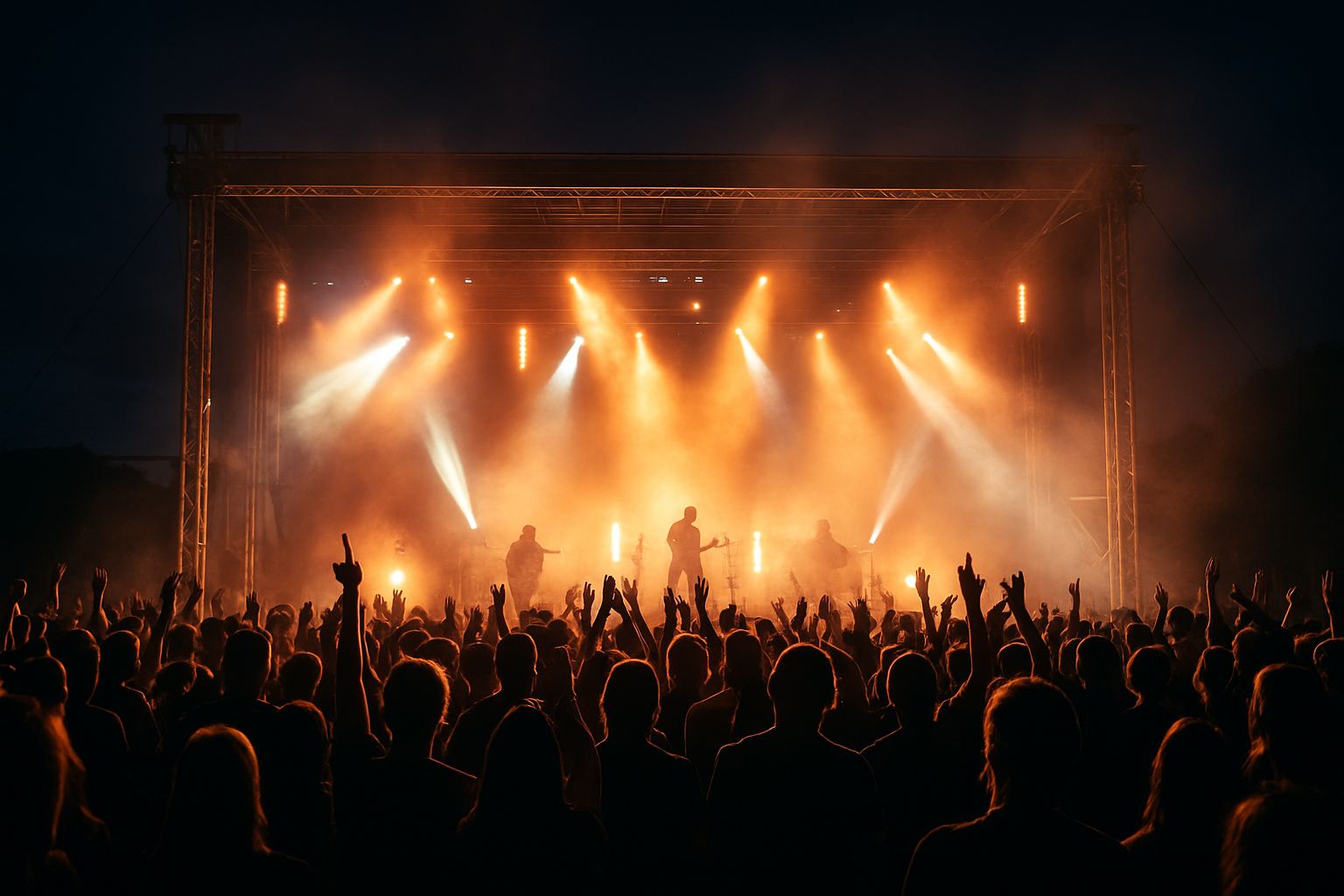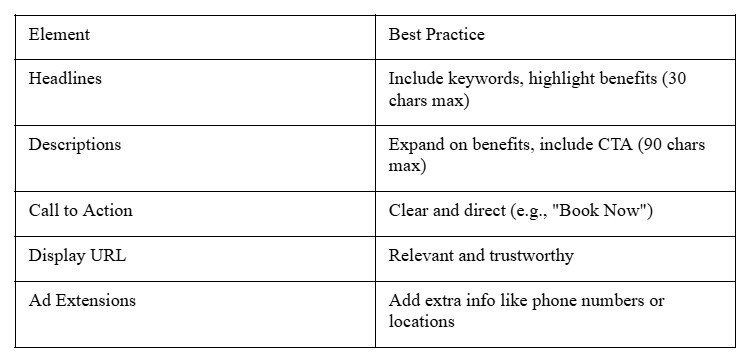Register as an organizer
Click the button below and finish your organizer registration, or fill out the form and we will be in touch to assist you.

Getting your event noticed on Google Ads can feel like a puzzle, right? You want people to actually sign up, not just see your ad. It’s all about setting things up smart from the start. We’re talking about how to structure your campaigns so that every click is more likely to lead to a booking or ticket sale. Let’s break down how to make your Google Ads event conversions happen.

Setting up your Google Ads account correctly from the start is like building a solid foundation for a house. If it's shaky, everything else you build on top will eventually have problems. For event promotion, this means making sure your account is configured to accurately track who's signing up or buying tickets. It’s not just about getting clicks; it’s about getting people to actually attend your event.
At the very top level of your Google Ads account, there are some key settings that affect everything. Think of these as the account-wide rules. You'll want to make sure your account name is clear, your billing is set up, and importantly, your time zone is correct. This last one is pretty important for ad scheduling. Also, enabling auto-tagging is a must for conversion tracking; it adds a special tag to your URLs so Google knows what's happening after someone clicks your ad. You can also set up a tracking template here if you use other systems to track where your clicks come from, like UTM parameters. Getting these basics right means you're ready to measure what matters.
Connecting your Google Ads account to Google Analytics (GA4) is a really smart move. It’s not strictly required, but it gives you a much clearer picture of what happens after someone clicks your ad. You can see how users interact with your website, which pages they visit, and if they complete other actions besides just signing up for your event. This connection helps you understand the full customer journey, not just the initial click. It’s a bit like getting a second opinion on your advertising performance. You can link them through the 'Tools & Settings' menu, under 'Linked Accounts'.
Within your account settings, you'll define what counts as a 'conversion'. For an event, this could be a ticket purchase, a form submission for more information, or even a phone call. You also need to choose an attribution model. This model decides how credit is given to different ads if a user interacts with more than one before converting. For instance, if someone sees a search ad, then clicks a display ad, and then converts, the attribution model determines which ad gets the credit. Models range from 'first click' (giving all credit to the first ad) to 'last click' (giving all credit to the last ad) or even more complex ones that spread the credit out. Choosing the right model helps you understand which parts of your advertising are truly driving results. Getting these foundational settings right is key to understanding your campaign's true success. You can find more details on choosing the right model in Google Ads best practices.
It’s easy to get caught up in the day-to-day of creating ads and managing bids, but taking the time to set up your account structure and conversion tracking properly upfront will save you a lot of headaches and wasted money down the line. Think of it as an investment in accurate data and better decision-making for all your future event promotions.
When you're setting up your Google Ads account, thinking about the campaign level is super important for getting event bookings. This is where you lay the groundwork for everything else. Your campaign is the main container for your advertising efforts. It's like the big umbrella that covers your goals, your budget, and where your ads will show up. Getting this right from the start means your ads are more likely to reach the right people who actually want to book your event services.
First off, what do you actually want to achieve with your ads? For event bookings, your main goal is probably getting people to sign up or request a quote. Google Ads lets you pick objectives like 'Leads' or 'Sales'. If you want people to fill out a form or call you, 'Leads' is usually the way to go. If you have an online booking system where people can pay right away, then 'Sales' might be a better fit. It's not just about getting clicks; it's about getting useful clicks that lead to actual bookings. Think about what success looks like for your event business.
Google Ads has a bunch of campaign types, but for events, some are definitely better than others. For most event rental businesses, starting with a Search campaign is the smartest move. These are the ads that show up when someone types something like “party chair rentals” or “wedding tent hire” into Google. Why? Because these people are actively looking for what you offer, meaning they have high intent. Other types, like Display campaigns (banner ads on websites), are more for building brand awareness or retargeting people who have already visited your site. Performance Max campaigns can be good for broad reach, but they need a lot of creative assets and give you less control, so Search is usually the best starting point.
Your budget is how much you're willing to spend each day or month. Bidding is how much you're willing to pay for each click. It sounds simple, but it's a bit of a balancing act. You want to bid enough to get your ads seen by the right people, but not so much that you're burning through cash too quickly. A good starting point is to use an automated bidding strategy that focuses on conversions, like 'Maximize Conversions' or 'Target CPA' (Cost Per Acquisition), once you have enough conversion data. This lets Google's system figure out the best bids for you. Remember, your budget and bids directly impact how often your ads show and who sees them. It’s a good idea to monitor your Google Ads management closely to see how these settings are performing.
Setting realistic budgets and understanding bidding strategies are key to not wasting money. You need to find that sweet spot where you're visible enough to get bookings without overspending.

When you're setting up your Google Ads account, organizing your ad groups is a big deal. It’s how you keep things tidy and make sure the right ads show up for the right searches. Think of ad groups as specific folders for your services or event types. Each ad group should focus on a narrow theme, like 'wedding chair rentals' or 'birthday party tents'. This tight focus helps Google understand what you're advertising and show your ads to people who are actually looking for that specific thing. This relevance is key to getting more clicks and fewer wasted dollars.
Start by grouping keywords that are very similar in meaning and intent. If someone searches for 'rent tables for party' and 'party table rental near me,' those keywords belong together. But 'wedding decorations' and 'corporate event planning' probably shouldn't be in the same ad group. You want each ad group to have a clear, single theme. This makes it easier to write ads that directly match what people are searching for. For example, if you rent out bouncy houses, you might have one ad group for 'bounce house rentals,' another for 'inflatable party rentals,' and maybe a third for 'kids party rentals.' This way, your ads can be super specific.
User intent is basically what someone is trying to achieve when they type something into Google. Are they just browsing, or are they ready to book? Your ad groups should reflect this. If someone searches 'how much do party rentals cost,' they're probably in the early stages of planning. An ad group focused on informational keywords like this might lead to a blog post or a general services page. But if someone searches 'book bouncy house now,' they're ready to go. That keyword needs its own ad group, with an ad that says 'Book Your Bouncy House Today!' and links directly to your booking page. Understanding this difference helps you create ad groups that match the user's mindset at that exact moment. It’s all about putting the right message in front of the right person at the right time. You can see how organizing your Google Ads account systematically can make a big difference.
Having ad groups that are too broad is a common mistake. When an ad group covers too many different services or ideas, your ads become generic, and your keywords get mixed up. This hurts your Quality Score, which means you pay more per click. The best practice is to create ad groups with a single, clear theme. This means each ad group should have a tightly related set of keywords and ads that all point to one specific service or product. For instance, if you offer different types of tents, you might have separate ad groups for 'frame tent rentals,' 'pole tent rentals,' and 'canopy tent rentals.' This level of detail allows for highly targeted ad copy and ensures that your landing page is perfectly relevant to the search query. It might seem like more work upfront, but it pays off in better performance and lower costs.
A great event ad does more than just grab attention, it gets people to click, engage, and ultimately buy tickets. From the visuals you choose to the words you write, every detail matters in turning interest into action. By understanding what motivates your audience and structuring your ads around clear goals, you can create campaigns that not only look good but also drive real results.
When people search on Google, they're usually looking for something specific. They want answers, prices, or to know if something is available. Your ad copy needs to speak directly to what they're thinking. If someone searches for "event tent rentals," your ad should immediately confirm you offer that. Mentioning things like "instant quotes" or "available this weekend" can really grab attention because it addresses their immediate need.
Make sure the words people are searching for show up in your ad's headlines. Google highlights these terms, making your ad look more relevant and increasing the chance someone clicks. Think about what makes your event services stand out. Do you offer free setup? Maybe you have unique decor options? Mentioning these unique selling points, like "free delivery" or "exclusive floral designs," can make your ad much more appealing than a competitor's. It’s about showing why you’re the best choice for their event.
Every ad needs to tell people what to do next. Don't leave them guessing. Use clear calls to action (CTAs) like "Book Your Date Today," "Get a Free Quote Now," or "Check Availability." A strong CTA guides the user and encourages them to take that next step towards booking your event services. It’s a simple but really important part of getting people to convert.
Here's a quick look at what makes a good ad:

Remember, Google's Responsive Search Ads let you test many headlines and descriptions. Google then figures out which combinations work best. This means you can improve your ad's performance without constantly tweaking it yourself. Just make sure you provide enough variety and don't repeat yourself too much.
So, you’ve got people clicking on your ads, which is great. But if they land on a page that’s a mess, they’re just going to leave. That’s where optimizing your landing pages comes in. Think of it as the final handshake before the sale, or in this case, the booking.
First things first, the page needs to match what the ad promised. If your ad talks about "early bird tickets for the Jazz Fest," the landing page should immediately show that. No one wants to hunt around for the information they clicked on. Also, speed is a big deal. People are impatient. If your page takes too long to load, especially on a phone, they’re gone. Use tools like Google PageSpeed Insights to check how fast your page is and find ways to speed it up. A slow mobile site is a real budget killer.
Once it loads, the page needs to be easy to use. This means a clean layout, clear headings, and not too much clutter. If you’re asking people to sign up for an event, the form should be simple and obvious. Make sure the main action you want them to take is right there, easy to see, without them having to scroll too much. Think about what someone needs to do to book their spot and make that the easiest thing on the page. Avoid pop-ups that block the content right away, unless they’re really well-timed and relevant.
Every landing page needs a clear call to action, or CTA. This is what tells people what to do next. It could be "Register Now," "Book Your Ticket," or "Get More Info." The button should stand out, and the text should be direct. If you’re running multiple ads for different aspects of your event, like VIP packages versus general admission, you’ll want different landing pages for each. This way, the message stays consistent from the ad click all the way to the conversion. It’s all about making it as simple as possible for someone to go from interested to registered. You can find some good examples of how to structure these pages in this guide on creating personalized landing pages.
So, your event campaigns are live, and you're seeing some action. That's great, but the real work starts now. You can't just set it and forget it; you've got to keep an eye on things and make smart adjustments. It’s all about making sure your ad spend is actually working for you.
Two reports are super helpful here: the Search Terms report and Auction Insights. The Search Terms report shows you exactly what people typed into Google to find your event. This is gold for spotting new keywords you might have missed or finding search terms that aren't relevant to your event at all. If you see weird searches triggering your ads, add them as negative keywords. It’s like cleaning up your targeting. Auction Insights, on the other hand, shows you how you stack up against other advertisers. You can see if you’re getting more impressions than them, or if they’re outbidding you. This helps you understand your competition and where you might need to adjust your bids or ad copy. Paying attention to these reports is key to understanding what's really happening with your ads.
Never stop testing. Seriously. Try different ad headlines, descriptions, and calls to action. See what gets people clicking. You can also test different bidding strategies. Maybe Maximize Conversions isn't working as well as you hoped, and a Target CPA approach would be better. It’s a bit of trial and error, but that’s how you find what clicks. Also, don't forget about your landing pages. A/B testing them can make a big difference in how many people actually sign up after clicking your ad. Remember to give any changes some time to gather data before you decide if they're working.
Google's AI is pretty smart these days, and you can use it to your advantage. Tools like Performance Max campaigns can automate a lot of the heavy lifting, but you still need to guide them. You can feed them good data, like using audience lists, including remarketing and custom intent lists, as signals to accelerate Google's AI learning process and improve campaign performance. This helps the AI understand who is most likely to be interested in your event. Think of it as giving the AI a cheat sheet. It helps the AI understand user behavior and preferences more effectively, leading to better campaign results. It’s not about letting the AI run wild, but working with it to get the best outcomes.
Making data-driven decisions is the name of the game. Don't guess; look at your reports and see what the numbers are telling you. Small, consistent changes based on data usually lead to the biggest improvements over time.
So, we've gone through how to set up your Google Ads account and structure your campaigns for events. It’s really about making sure your ads show up when people are actually looking for what you offer. Remember to keep your campaigns focused, group your keywords logically, and write ads that speak directly to what your potential attendees want. Don't forget to set up tracking so you know what's working and what's not. It might seem like a lot at first, but breaking it down into these steps makes it manageable. Keep testing and tweaking, and you'll get better results over time.
Think of your Google Ads account like a filing cabinet. Your account is the whole cabinet. Inside, you have different drawers called campaigns. Each campaign drawer has smaller folders called ad groups. Inside those folders are your actual ads and the words people search for (keywords). This setup helps keep everything organized so you can find what you need and make sure your ads are shown to the right people.
It's super important to group similar things together. For example, if you're selling party rentals, you'd have one group for 'wedding chairs' and another for 'bounce houses.' This way, when someone searches for 'wedding chairs,' they see ads specifically about wedding chairs, not bounce houses. It makes your ads more relevant and helpful.
Your main goal for advertising should guide how you set up your campaigns. If you want people to sign up for your event, your goal is 'leads.' If you want them to buy tickets right away, your goal is 'sales.' Choosing the right goal helps Google show your ads to the people most likely to do what you want.
You should create ads that directly answer what someone is searching for. If they search for 'cheap event tickets,' your ad should mention 'cheap tickets' and maybe even the price. Also, tell people exactly what you want them to do, like 'Buy Tickets Now!' or 'Get Your Free Quote!'
Your landing page is the page someone sees after clicking your ad. It needs to be super relevant to the ad they clicked and load really fast. If someone clicks an ad for 'VIP event passes,' the landing page should be all about VIP passes, not just general event info. Make it easy for them to buy or sign up!
You need to keep an eye on how your ads are doing. Look at which search words are bringing people to your site and which ones aren't working. Also, see how you compare to other businesses advertising the same things. By checking these things regularly, you can make your ads better and spend your money more wisely.
More blogs
Click the button below and finish your organizer registration, or fill out the form and we will be in touch to assist you.